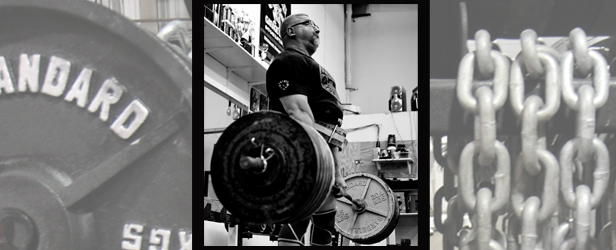
The great philosophers pontificate about man’s existence preceding his essence. This in short means that truly every other species on the planet has a purpose in life, its rightful place in the food chain, a responsibility, a function. We, as part of the human species, are aware that we are aware, realize that we can realize, and think about how we’re able to think. This puts us in a situation where we’re more than just food for the next highest form on the chain.
Because our existence precedes our essence, we have to make our own reason for being here on this planet. We have to make choices each day and truly strive to accomplish something significant before we end up pushing daisies like all other little creatures do. We have to make our lives significant and of substance because we, unlike a fish or bird, know that we’re going to end up “dead as a doornail” one day.
How do we make ourselves significant, and what in the world does that have to do with powerlifting? As we go through our lives, there are basically two pains that we will encounter on our journey—the pain of discipline and the pain of regret. The first pain, discipline, as it relates to powerlifting, is the pain the powerlifter goes through if he is truly a student of the sport. The powerlifter goes to the gym like clockwork. He pushes his body to the limit, and often times, past its limit. A powerlifter’s discipline involves his ability to stay with a nutritional plan and pass on things that could take away from his goals of being the best powerlifter he can possibly strive to be.
Discipline drives him to perform the next rep, the next set, the next movement. Being disciplined means rarely cheating by avoiding the hard work that is involved in being a true champion. Ernie Frantz always says, “Winners are simply willing to do what non-winners aren’t.” Being disciplined means keeping one’s eyes on the prize, setting little goals to reach that one big goal, and following the plan to fruition. This involves the pain of discipline. These physical and mental components of discipline are literally painful. It hurts pushing the body so hard you risk injury, squatting so heavy that your nose bleeds, pulling that third super heavy rep on the deadlift and seeing all those stars before your lifting partner helps you to the bench in case you pass out. Spend a couple of sessions at QUAD’S gym and watch Ed Coan deadlift. When “the man” passes out from his set, it’s truly the walking, living, and breathing definition of the pain of discipline.
So fast forward with me and look at the two lives that I’m going to paint for you in these last paragraphs. Life one is the lifter who chose the pain of discipline. He is now 45-years-old. In addition to all the typical things that life serves you such as a home, family, and job, this lifter has reached his long-term powerlifting goals and has won a state, or national, or perhaps a world championship. He can enjoy his powerlifting lifestyle, and he can look back at the relationships made, friendships forged, and records set. He can say, “Hey, I took life by the horns and rode it all the way, never looking back, never giving up, always choosing the pain of discipline. Now, I I have one more precious part of my life that I can hold my head high and say that I made that portion of my life significant. I accomplished what I went out to accomplish. I have made my mark in the history of powerlifting. But more importantly, I have no regrets.”
Now, here’s life number two. He is also a 45-year-old, but he chose not to endure the pain of discipline. Rather, he chose the path of least resistance. He looks at his ailing health, his potential lost, the 25 years that have past since he was a 20-year-old with endless potential and promise. It has all been squandered. This person has become one of ten million average, remote control flicking, beer bellied would-a, could-a, should-a’s who every morning feels the pain of regret. He feels the regret of a life wasted with “Three’s Company” reruns and fast food. That person will have a life of suffering due to the pain of regret that is by far a greater feeling of suffering than the powerlifter would ever encounter in a thousand squat days. No pain hurts like the pain of regret.
Powerlifters choose the pain of discipline because they have a zeal for life and a desire for victory. They live life fast and strive for excellence. If you’re taking the time to read this article on EliteFTS, you are most likely looking for something to jump out and move you. Here’s that something.
Regardless of whether or not your lifts at the gym are insane like Chuck Vogelpohl’s, Jessie Kellum’s, or Andy Bolton’s, or your lifts are half-hearted efforts and you’re really just going through the motions, five, ten, fifteen, and twenty years of your life are going to come and go. You can never get that time back once it has passed. Take the time, make the physical and mental investment, choose the pain of discipline, and make each day in the gym a day that you can look back at and say, “This was a good day.” Regret nothing. Celebrate everything. Ever onward…








